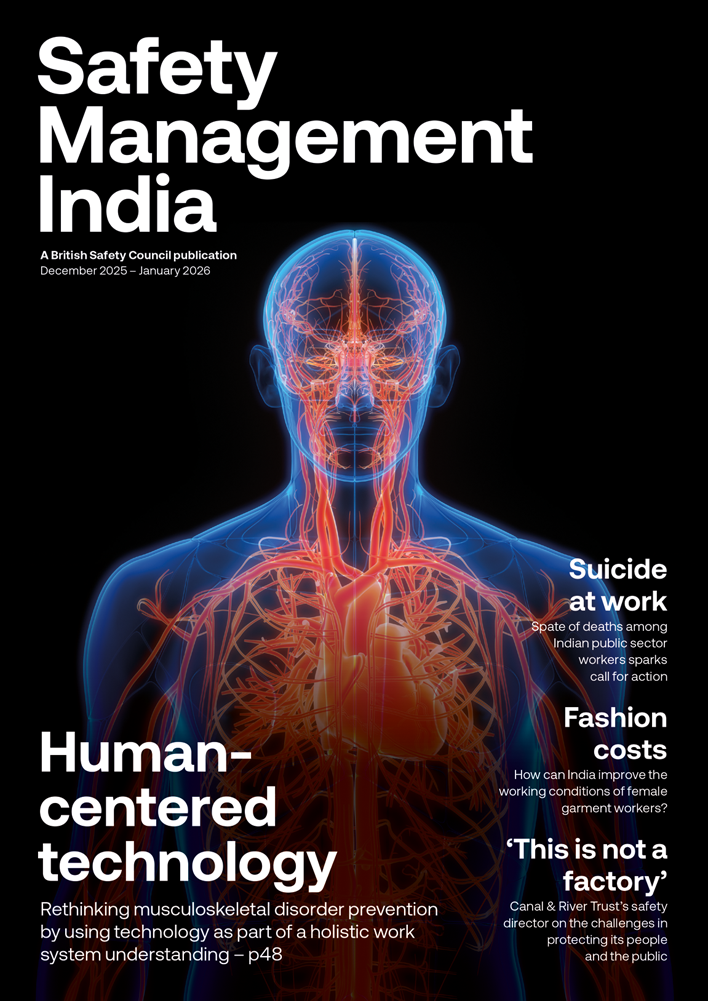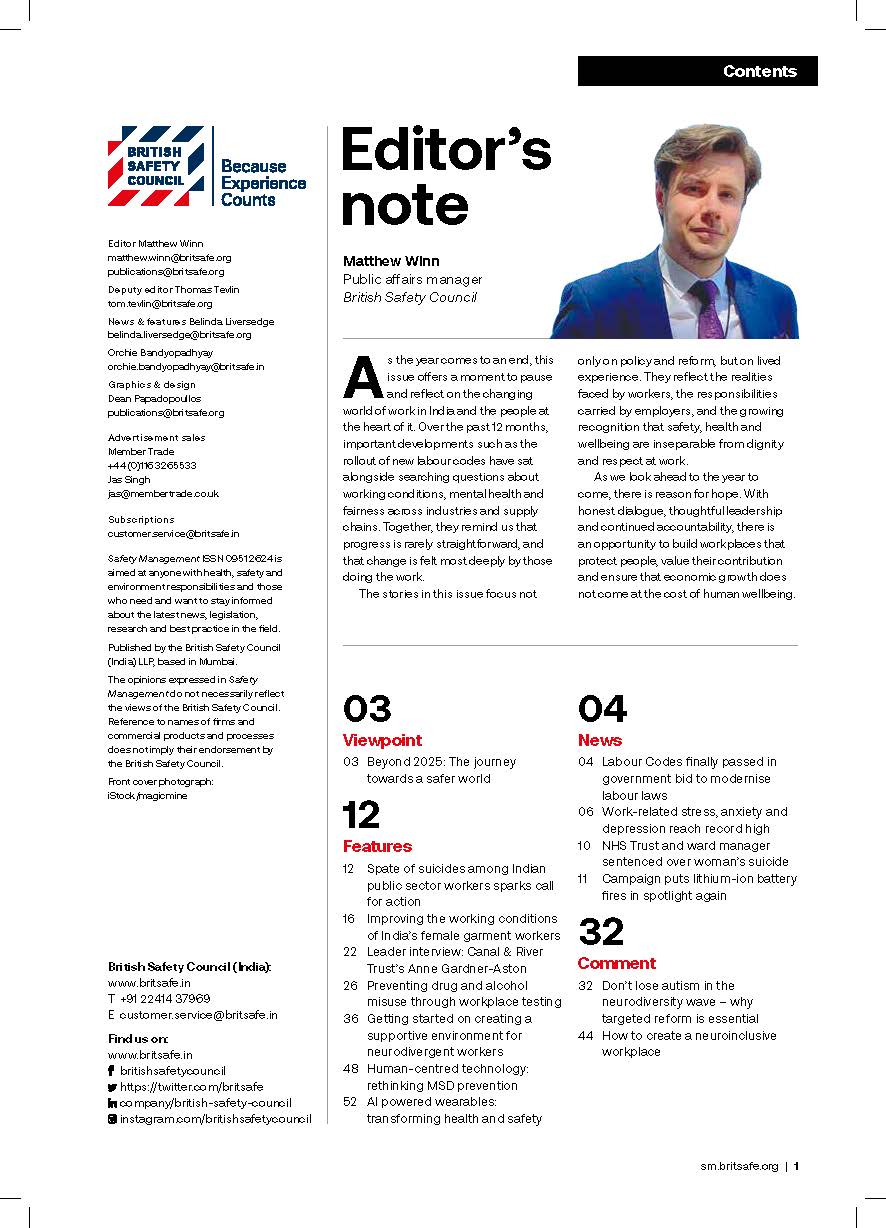The Indian government recently ordered road construction employers to grant paid maternity leave to registered female road construction workers, but campaigners warn that many women in the unregistered construction sector will miss out on this vital new benefit.
Features
Maternity leave: India’s female road workers granted landmark rights
After agriculture, construction is the second largest industry in India, and, unlike in many developed countries, the sector employs a large number of women. In fact, although in many countries construction is generally a male-dominated industry, recent data from India’s Ministry of Labour and Employment estimated that 49 per cent of the country’s construction workers are women.
However, the construction sector in India is also largely unregulated, with workers often migrating from rural to urban areas in search of jobs, putting them at risk of exploitation, poor wages and poor working and living conditions. Female construction workers are perhaps particularly vulnerable to exploitation, such as inadequate or withheld wages and poor welfare facilities, such as a lack of latrines and unsuitable accommodation.
So, when the central government recently instructed employers in the road construction industry to provide paid maternity leave to registered female road construction workers there was jubilation among the sector’s female workforce.
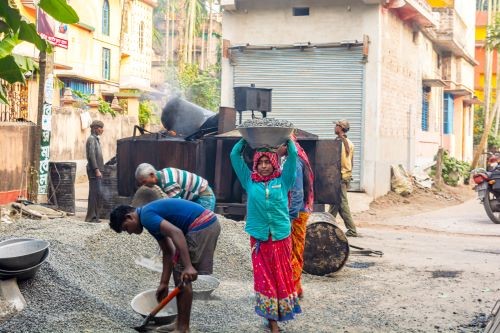
Photograph: iStock, credit Soumen Tarafder
Advisory notes for employers
In a series of advisory notes issued by the Ministries of Road Transport and Highways (MoRTH) and Housing and Urban Affairs, the government instructed all agencies contracted to carry out road building work for these departments to provide registered female road construction workers with 26 weeks paid maternity leave for the birth of up to two children. If a female employee in the road building sector gives birth more than twice, or for adopting mothers, employers of registered female road workers must provide 12 weeks of paid maternity leave.
The advisories also state that if a registered female road construction worker experiences a miscarriage, she is entitled to paid leave with wages equivalent to maternity benefits for six weeks following the day of the miscarriage.
According to a news report in The Times of India, The advisory from the Ministry of Road Transport and Highways said: “For ensuring wide participation of women and providing gender equal opportunities in the highway sector, MoRTH has decided to issue an Advisory in line with the Statutory Provisions to all implementing agencies, which in turn, shall ensure and oversee the adoption of the Advisory by their respective contractors/concessionaires.”
The advisory also instructed employers in the road construction industry to ensure that registered female construction workers in the sector are paid digitally (for example, via bank transfer), to ensure they are not exploited or underpaid by unscrupulous employers.
The note further instructed employers in the highways construction sector to ensure that facilities, such as latrines and urinals, washing, crèches for young children and adequate accommodation, are provided to migrant female workers in the industry, in line with the requirements of the Inter-State Migrant Workmen (Regulation of Employment and Conditions of Service) Act and Rules.
The move coincided with the publication of another advisory note for employers from the Labour and Women and Child Development Ministries, aimed at encouraging and boosting women’s participation in the workforce. Among other things, this reminded employers of the importance of providing a safe and supportive environment for female workers during night shifts – for example, by providing pick-up and drop-off transportation services after dark.
According to The Indian Express, commenting on the new instructions for employers working for the government in the road building industry, Smriti Irani, Minister for Women and Child Development, said: “The advisory for female construction workers [in the road building industry] across the country mandates them to be given 26 weeks of maternity leave by their employers.
“Now, this is nothing less than revolutionary. Not just putting ink to paper, but ensuring officers actively consider the availability of such facilities to women.”
Minister Irani added: “As per the advisory, the wage of women construction workers has to be transferred through an online medium to avoid them getting duped by their supervisors.
“Now that the advisory is in place, it becomes easy for the officers and the ministry to compute the impact of such advisories to the female construction workforce across the country.”
Glaring inequalities
Reacting to the news, Pia Mondal, a 32-year-old construction worker, said: “The construction industry is seen as a ‘man’s world’, and glaring inequalities are still prevalent in the industry, especially in terms of wages. So, I am happy that the government has finally thought about the women workforce.”
However, although both Mondal and her husband work in the building industry, they are still not formally registered as construction workers, meaning they are likely to miss out on the new maternity benefits. “The online registration system is complicated, and we are not so educated to understand how to go about the registration process,” she said.
Mondal added that, as a woman, she finds construction work physically demanding, due to the frequent lifting of heavy objects, working in extreme weather conditions and navigating harsh terrain. “I help by carrying bricks, cement and buckets of water while my husband does the bricklaying and plastering at the site,” she stated, adding that her salary is almost 30 per cent lower than her husband’s.
Another female labourer at the site where Mondal works in Delhi said that, as well as being paid less than men, female workers are often exposed to safety hazards and sexual harassment.
Wage disparity
Commenting on the wage disparity between male and female construction workers, Arup Mitra, a professor of economics at the Institute of Economic Growth in Delhi, said: “Women in the construction sector earn substantially lower than their male counterparts because of a bias against female productivity and women’s low bargaining power.”
Construction work is described by the International Labour Organization (ILO) as “one of the most hazardous and accident-prone activities”, and Mondal and her husband sometimes work for 10 to 12 hours a day without any breaks, for the entire week. “I sometimes have to carry loads of 51 kilograms and since most construction sites lack basic facilities such as toilets, women are forced to relieve themselves in the open,” said Mondal.
Although in October 2023 Delhi’s Labour Minister Raaj Kumar Anand made it mandatory for construction companies to provide separate toilet facilities for female workers at all building sites in the city, Mondal said she was unaware of the directive.
At the same time, the Labour Minister also stated that construction companies and contractors in Delhi needed to “promptly” rectify disparities in wages for similar work among male and female labourers, therefore ensuring equal wages for female workers. However, Mondal was also unaware of this state government instruction.
In fact, organisations such as the Self-Employed Women’s Association (SEWA) – one of India’s oldest and largest trade unions, which represents almost three million self-employed women working in the informal economy – say most female construction labourers are unaware of their employment, safety and social security rights.
Government action
Meanwhile, although many activists welcomed the government’s efforts to ensure employers grant maternity leave to female laborers in the road construction industry, some warned the move must be supported by effective government action to ensure that female workers on the ground actually receive the required maternity pay.
Campaigners say the government must therefore take steps to ensure that all women in the road construction sector are granted paid leave for maternity and miscarriage, irrespective of their registration status or whether they have access to individual bank accounts. “Further refinements and targeted initiatives may be required to address the unique challenges faced by unregistered labourers and those without bank accounts,” warned one activist.
Commentators also warn that the instruction for wages to be deposited directly into bank accounts wrongly assumes that all female construction workers have individual bank accounts. They point out that a large number of women in the informal sector do not have bank accounts, potentially excluding them from the intended benefit of having their wages paid directly to avoid potential exploitation or underpayment by employers.
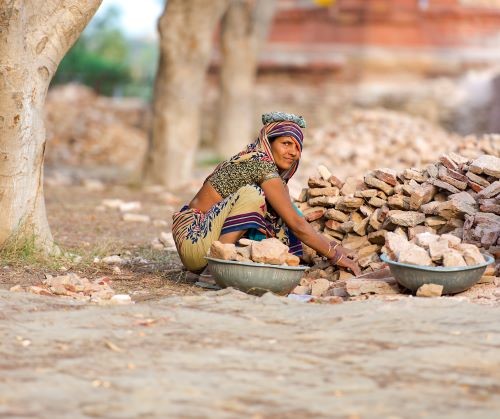
Photograph: iStock, credit AlxeyPnferov
Air pollution
As well as the physical toll from activities like lifting, handling and carrying heavy construction materials, construction workers are regularly exposed to airborne respiratory health hazards – both dusts and fumes from the work itself and from the pollution air in built-up urban areas. Activists say female construction workers are disproportionately affected, with many of them suffering from breathlessness.
“Many women breathe in debris linked by medical professionals to various illnesses, including tuberculosis and cancer, as well as to skin and breathing conditions, but delay seeking treatment due to the lack of options before them,” said an expert.
Thaneshwar Dayal Adigaur, secretary of Delhi Asangathit Nirman Mazdoor Union, a construction workers’ union, said: “Women suffer far more in this [building] work... primarily because there is no compliance with safety standards.”
Adigaur, who has been involved in advocacy and support work among construction workers for the past 30 years, warned that public awareness about the health risk that air pollution poses to outdoor workers – including construction labourers – only gained traction after the government in Delhi began introducing temporary bans on certain construction activities that contribute to the city’s poor air quality, particularly in the months of October and November.
To educate female construction workers about the health risks from air pollution, Mahila Housing Trust (MHT), in association with Purpose India, recently launched a campaign setting out the impact of air pollution on the health of outdoor female workers and their children.
However, most activists say that although some construction workers are aware of the impact of air pollution on their health, little action is taken by employers and the government to protect them.
Meanwhile, research found that female construction workers report a number of risks to their health, safety and wellbeing at work, including a lack of toilet facilities (reported by 80 per cent of those questioned); a lack of drinking water (70 per cent); the physically taxing nature of the work (67 per cent); and long working hours (60 per cent). Other commonly reported risks and failings included non-availability of childcare facilities (46 per cent) and unwanted sexual advances (eight per cent).
Like their male counterparts, female construction workers are also at significant risk of fatal and serious occupational injuries. For instance, a study found that the annual construction site injury rate per 100,000 women workers was 82.26, although this was significantly lower than the rate for males, which was estimated to be 146.5.
Commentators say construction industry employers should adopt a number of measures to reduce the risk of injury to female workers, such as ensuring all female workers are given suitable personal protective equipment.
FEATURES
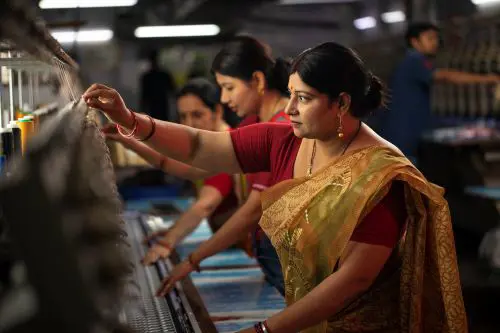
The price of fast fashion is not pretty
By Orchie Bandyopadhyay on 11 December 2025
The largely female workforce in India’s garment manufacturing industry faces long hours, low wages and poor working conditions, and campaigners say it is time the Indian government and international clothing brands took tougher action to improve working conditions, pay and employment rights.

Suicide at work: a major problem in India
By Orchie Bandyopadhyay on 11 December 2025
Recent reports of suicides among workers ranging from police officers to electoral roll officials have prompted calls for employers and government agencies to do more to both reduce excessive workloads and provide better mental health support at work.


